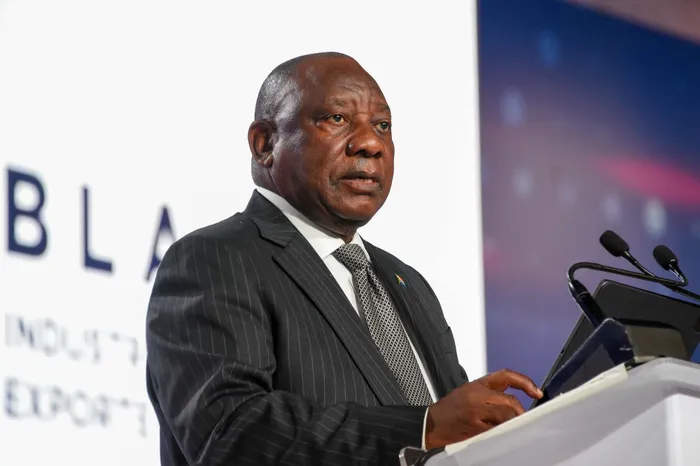There can be no growth without economic inclusion, says Ramaphosa

President Cyril Ramaphosa yesterday, officiates at the opening of the first Black Industrialists and Exporters Conference at the Sandton International Convention Centre in Johannesburg. Photo: Supplied
President Cyril Ramaphosa has come out in full support of the black economic empowerment (BEE) laws in South Africa as one of the means to achieve inclusive economic growth.
Ramaphosa yesterday said that black businesses should have a seat at the table and enjoy meaningful and equitable participation in the economy without any barriers.
South Africa will mark 20 years since the adoption of the BEE Act next year.
Ramaphosa said an economy that only benefited a few, and did not reflect the country’s demography, would never be sustainable or dynamic.
“There can be no growth without economic inclusion and without a business sector that reflects the diversity of our people and our society,” Ramaphosa said.
“There can be no inclusive recovery and reconstruction unless broad-based black economic empowerment is at the centre of our efforts.”
Last month, Ramaphosa appointed a 14-member Broad-Based Black Economic Empowerment (BBBEE) Advisory Council to lead advocacy campaigns and counter negative narratives around transformation in the country.
Yesterday, Ramaphosa said the council has been tasked with advising on the future trajectory of B-BBEE as the country rebuilds from years of slow economic growth and the impact of the Covid-19 pandemic.
Ramaphosa was speaking at the opening of the inaugural Black Industrialists and Exporters Conference in Sandton.
The conference reflected on the performance of the government’s Black Industrialists programme since its inception in 2015.
Estimates by the Industrial Development Corporation suggest that the socio-economic returns of the Black Industrialist programme have been even more far-reaching.
This includes supporting and creating some 55 000 jobs and adding more than R160 billion to the country’s gross domestic product (GDP).
A study by the Department of Trade, Industry and Competition found that companies with employee stock ownership plans employed at least 450 000 workers.
Ramaphosa said the government has given R55bn to support the growth of black industrialists over the past 11 years, growing black-owned formal businesses from 150 000 in 1994 to more than 300 000.
The president urged the private sector to commit to procure more from emerging black businesses and to support their integration into value chains, even if it means changing value chains to accommodate black businesses.
“Unless tangible, sustainable measures are implemented, we run the risk that empowerment opportunities are confined to black businesses transacting with the state,” he said.
“We run the risk that the private sector, and big business in particular, makes little or no contribution to the empowerment of black entrepreneurs. We run the risk of stifling economic growth.”
The business sector highlighted challenges of the crippling energy crisis, but the government said it would announce a set of measures to add additional power to the grid in the shortest possible time.
Finance Minister Enoch Godongwana said the government was working on an approach to deal with the Eskom situation.
Godongwana said too much time has been focused on trying to fix the power utility instead of generating electricity for the grid.
“We are spending a lot of time trying to fix Eskom, a monster which is difficult to fix because of its complexity, and we have not been focusing on putting power to the grid,” Godongwana said.
“So we are applying now, and I’m sure the president will be talking to the nation soon, of a two-pronged approach: how to fix Eskom and how to fix power to the grid using the private sector.”
BUSINESS REPORT